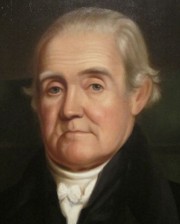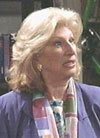On language: The little word that could
August 22, 2015
We were at the American Museum of Natural History in New York recently, and I asked a uniformed employee of the museum how to get to the Imax theater.
He said something like the following: “So you go through that door to your left, turn left again and walk all the way through the gift shop and through the exit at the other end, and you’ll come right to the theater.”
“So.”
He started that sentence with “so.”
It wasn’t “so” as a conjunction introducing a dependent clause: “So that we’re not late for the theater, we’re catching the 9:30 train.”
It wasn’t “so” implying prior knowledge of the subject about to be introduced: “So, how was your trip to Peoria?”
And it wasn’t “so” used as an adverb: “So many people declined the invitation that we had to cancel the party.
In this usage, “so” may be best identified as an interjection that conveys no meaning of its own. I have seen the usage defined as a “linguistic pause.”
In that sense, it is similar to the words “say” and “why,” which one hears in the films noir of the 1940s: “Say, for two cents I’d knock your block off!”
I first noticed this usage of “so” while listening to an interview on NPR perhaps seven or eight years ago, but I find that it has been around much longer than that and is the topic of conversation on a lot of web sites devoted to language.
Some folks are quite passionate in their demands that the usage be stopped.
A writer on one business-oriented web site argued that using “so” in that way while engaged in commerce insults your listener, undermines your credibility, and signals that you are not altogether comfortable with what you’re about to say. (I thought there was something suspicious about that museum guide, and we did get lost on the way to the Imax.)
One person responding to that writer pointed out something that hadn’t occurred to me—that comedians for generations have used that construction: “So a priest, a minister, and a rabbi walked into a bar ….”
For me, whose life is all about the English language, this is an interesting example of how our manner of speech evolves over time. Often, change occurs without us noticing it. When did movie tough guys stop using “say”? But in this case it’s a specimen that we can observe and that probably is harming no one except linguistic fussbudgets, and that probably will fade away just as innocently as it came.
Incidentally, the bartender looked up and said, “So what is this—some kind of a joke?”
Books: “Words from the White House”
March 20, 2013
When we were watching episodes of Downton Abbey on a DVD, we turned on the English subtitles, because we had trouble understanding a couple of the actors — particularly Rob James-Collier as Thomas Barrow and Sophie McShera as Daisy Mason.
It turned out that while some of our difficulty with the dialogue had to do with the one actor’s mumbling and the other one’s accent, some of it also had to do with the vocabulary itself — British terms that we did not know.
Most of us are familiar with terms like “lorry,” “loo,” and “lift,” but we saw others in the captions that we had never heard before.
It was to be expected that the English used in Britain and the English used in the United States would evolve differently, but I learned recently that that didn’t happen only over time but was done deliberately, on our side of the ocean, soon after the American Revolution.
That’s what Paul Dickson reports in his book Words from the White House, which is a compilation of words and phrases that either were either coined or made popular by presidents and other prominent Americans.
According to Dickson, an 18th century sentiment shared by Thomas Jefferson and Noah Webster, was that Americans had to craft for themselves a language that was distinct from the “king’s English.”
Webster was so confident that this goal could be achieved that he wrote in 1806 that “In fifty years from this time, the American-English will be spoken by more people than all the other dialects of the language.”
Part of the process by which language evolves is “neologizing” — that is, inventing words or phrases from whole cloth.
Dickson writes that the word “neologize” was itself neologized by Jefferson in 1813 in a letter to John Adams.
So Theodore Roosevelt, who — for my money — is disproportionately represented in this book, was neologizing when he invented the term “pussyfooter,” and his distant cousin FDR was doing the same when he created the useful word “iffy.”
Some presidents have been accused of using non-standard terms, not because they were being inventive but because they didn’t know any better.
In this regard, for instance, Dickson mentions Warren G. Harding and George W. Bush.
Harding has often been ridiculed for his 1920 campaign promise of a “return to normalcy,” but Dickson points out that the word “normalcy” had been already in use in several fields, including mathematics.
Harding’s innovation was to give the term a political meaning — and, the author reminds us, it worked.
The second Bush — who could be hard on English — was kidded mercilessly for his used of the term “decider” which he applied to himself when the press asked him about calls for the resignation of Defense Secretary Donald Rumsfeld (“I’m the decider, and I decide what’s best.”) Dickson gives Bush credit for coining this word, but apparently the author didn’t check a dictionary: that word was around before George Bush was president, meaning exactly what he used it to mean.
The Life of Riley: A matter of perspective
January 14, 2011
One of the classes I taught last semester included a section on idiomatic expressions. A topic like that always calls attention to the difference in the ages of the students and the instructor. We came across many expressions that a person my age uses casually but that many or all of the students didn’t recognize. None of them, for instance, knew the expression “hocus pocus,” which refers to the things magicians do and say to create the illusion that they have paranormal resources.
Another example arose when, instead of instructing, I was telling the students about Marcello, the new cat at our house. We had met Marcello on the sidewalk outside a gift shop in North East, Md., and the chance acquaintance evolved into a permanent arrangement. Now, I told my students, Marcello is living “the life of Riley.”
As the words left my lips, I could read in the faces of the students that they didn’t know what that meant. My experience has been that students are a tolerant lot, and that they wouldn’t think of embarrassing the instructor by pointing that he had said something they couldn’t comprehend. They would have been content to go on living without knowing what that expression meant. So I asked them: “Do you know that expression?” They didn’t, and even though none of them asked, even then, what it meant, I told them.
That set me to wondering where that expression originated, but I didn’t have time until now to look it up. Apparently there is no definitive answer. One theory traces the phrase to a song written in 1898 by vaudevillian Pat Rooney Sr. In that song, a hotel owner named Riley looks forward the day when he strikes it rich. The phrase itself is not in the lyric of that song.
The expression does appear in a song called “My Name is Kelly,” which was written by Howard Pease in 1919. “Faith, and my name is Kelly, Michael Kelly / But I’m livin’ the life of Reilly just the same.” The fact that Pease used the phrase that way suggests that it was well known by that time. The author of a British web site, The Phrase Finder, writes that the first known instance of “the life of Riley” appearing in print in the United States occurred in 1911 in the Hartford Courant in a story about the demise of a notorious wild cow, something — I must confess — I have never heard of before: “The famous wild cow of Cromwell is no more. After ‘living the life of Riley’ for over a year, successfully evading the pitchforks and the bullets of the farmers, whose fields she ravaged in all four seasons.”
Of course, I associate the expression with the television comedy series that starred William Bendix as Chester A. Riley; Marjorie Reynolds as his wife, Peg; the gorgeous Lugene Sanders as their daughter, Babs, and Wesley Morgan as their son, Junior.
Although the expression implies that a man is living a life of ease, Chester Riley worked steadily in the wing assembly division of Cunningham Aircraft in Los Angeles. He was the stereotypical bumbling father who was always in some kind of scrape. He didn’t have many happy endings, and his closing line on most episodes became one of the most popular catch phrases of the era: “What a revoltin’ development this is!”
A radio show with the same title that appeared for a few months in 1941 was not related to the later series. Film star William Bendix appeared on radio as Chester Riley from 1945 to 1951. One of the developers of that series was Gummo Marx. Bendix was making a film version of “Riley” when the show moved to television in 1949, so Jackie Gleason was cast as Riley and Rosemary De Camp as Peg. A contributing writer for that series was Groucho Marx, who had once been considered for the title role on radio. The series won an Emmy, but it ended after one short season because of a contract dispute.
The show was introduced on television again in 1953 with Bendix and Marjorie Reynolds leading the cast, and it was a hit, running for six seasons. A 2009 BBC series with the same title is not related in anyway to the American shows.
While I was looking around for information about this show, I came across two modern-day uses of the expression “Life of Riley,” both with more serious and somewhat ironic applications. One is a foundation headquartered in Sarasota, Fla., that raises funds to promote awareness of and seek a cure for pediatric brain tumors. The organization is named for Riley Saba, a 7-year-old girl who died because of such a tumor. You can visit the foundation’s web site by clicking HERE.
Another site, this one located in Great Britain, was inspired by a boy whose first name is Riley. The youngster has a form of cerebral palsy, and a group of his family’s friends formed an organization to raise funds for charities that assist kids with that or similar conditions. Riley came by his first name because his dad was attracted to the song “The Life of Riley” by the Lightning Seeds. The song was written by Ian Broudie whose own son, Riley, now plays guitar with the group. You can learn more about the charity group by clicking HERE.
Many years ago, I wrote a story about a group of college students who were fans of the “Honeymooners” television series. These students hadn’t been born in the 1950s when the show had its initial run, but they couldn’t get enough of it. Although I do the same thing with “The Honeymooners” and some other vintage shows, I asked them why they watched the episodes so often that they could recite most of the dialog, and they told me that the way the writers and actors used language was one of the things that fascinated them.
Fast forward to “Seinfeld,” which still holds my interest partly because of the way the writers and actors used language — for instance, a particular device, very New York to my ear, used to evoke comparisons. This phraseology was used seven times in the series — five times by Jerry speaking to George or Elaine, once by Helen Seinfeld speaking to Jerry, her son, and once by George, speaking to Elaine.
The one instance in which Jerry wasn’t the speaker occurred in the series premiere, “The Stakeout,” in which Jerry tries to flirt with a woman he meets at a dinner party, annoying Elaine, who is, in effect, his date at the party. The next day, when Jerry’s visiting mother tells Jerry that Elaine called while he was out, he asks, “What was the tone of her voice? How did she sound?” To which Helen replies: “Who am I — Rich Little?”
In the episode known as “The Jacket,” Jerry makes a reference to composer Robert Schumann, but mispronounces the name, putting the accent on the first syllable. George says, “Artie Schumann, from Camp Hatchapee?” To which Jerry answers, “No, you idiot!” And George says, “Who are you — Bud Abbott? Why are you calling me an idiot?”
In “The Trip,” in which Jerry invites George to accompany him on a trip to Los Angeles, George arrives at Jerry’s apartment with a big pile of luggage. Jerry looks at the bags and says: “It’s a three-day trip. Who are you — Diana Ross?”
In “The Revenge,” George plans to get back at the boss who fired him from a real estate firm by slipping the boss a “mickey” at the firm’s anniversary party. When George reveals this plan, the incredulous Jerry says: “Who are you — Peter Lorre?”
In “The Wink,” Elaine tells Jerry that she has agreed to go on a date with the man who calls from her wake-up service. Jerry says: “I still can’t believe you’re going out on a blind date.” Elaine answers: “I’m not worried. It sounds like he’s really good-looking.” To which Jerry answers: “You’re going by sound? What are we — whales?”
And in “The Limo,” Jerry and George find themselves in a limousine with two neo-Nazis who think George is their leader. George suggests that they extricate themselves by jumping out of the moving car. “We’re doing sixty miles an hour!” Jerry says. “So we jump and roll,” George explains. “You won’t get hurt.” And Jerry replies: “Who are you — Mannix?”
Finally, in the episode in which NBC president Russell Dalrymple gets food poisoning after Elaine sneezes on his pasta primavera, George has a tumultuous session with his counselor, Dana, played by Gina Hecht. During the session, Dana tells George that she read the script for a sit-com pilot Jerry and George have pitched to NBC, and she was not impressed. When George repeats this to his friends, Elaine — who recommended Dana — says, “Maybe she didn’t think it was funny,” to which George replies, “Oh, she didn’t think it was funny? What is she – Rowan and Martin?”
Who are you? Who am I? A very “exerstential” question, as Elaine Benes observed.
For a list of actual people referred to in “Seinfeld” scripts, click on THIS LINK.



















